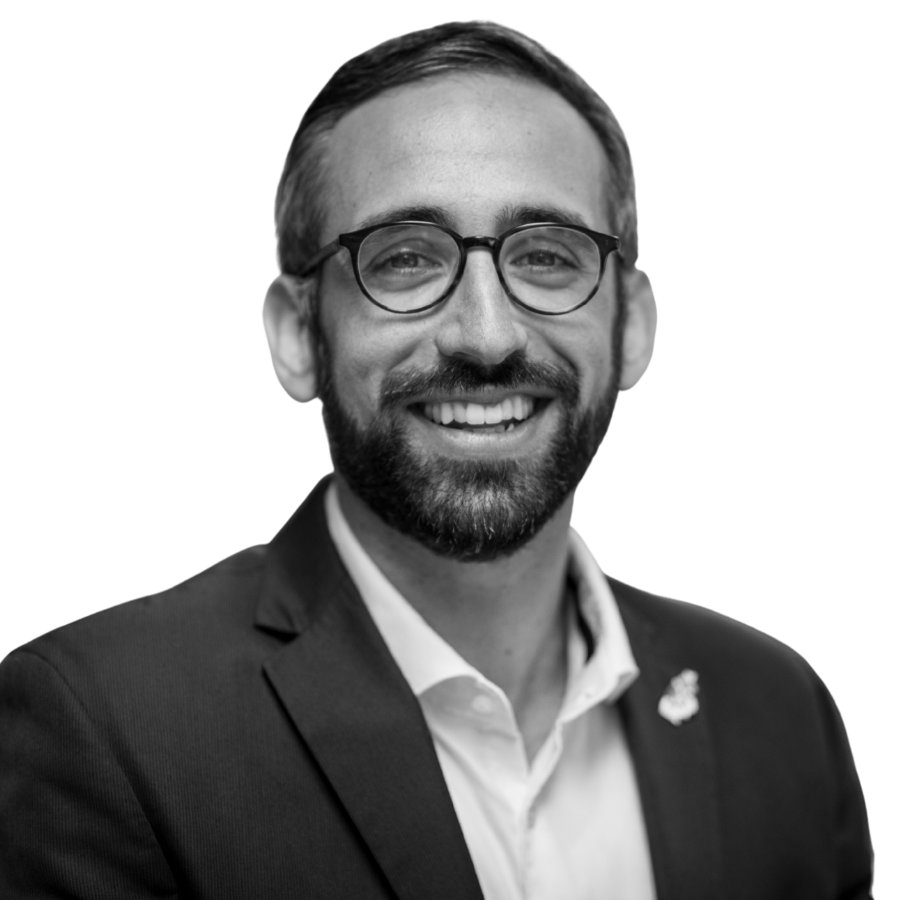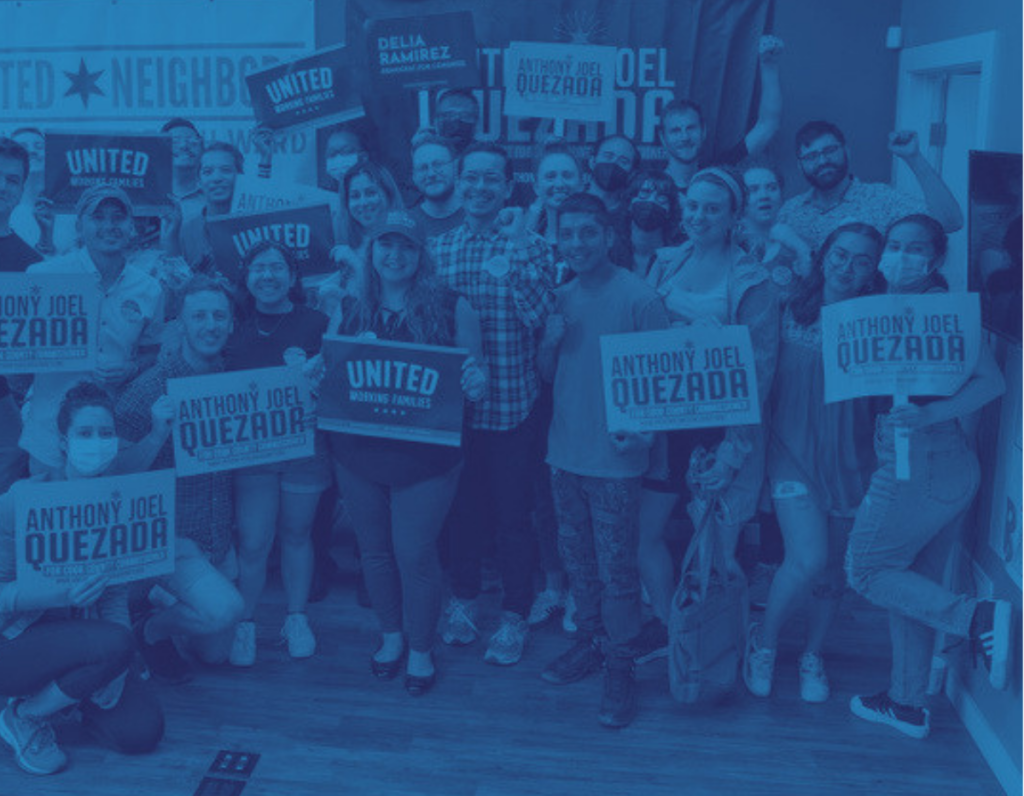Anthony Joel Quezada was facing—let’s put it mildly—some institutional obstacles to his candidacy.
For starters, he’s a 26-year-old queer Latino socialist from a low-income immigrant family in Chicago’s Logan Square neighborhood—precisely the kind of family gentrified out of the area by the tens of thousands during his lifetime.
After working in public service in the office of Chicago’s 35th Ward Alderman Carlos Ramirez-Rosa by day, and grassroots community organizing during nights and weekends, he decided to run for Cook County Commissioner of the 8th District in the Illinois Democratic Primary this June.
Commissioners have a critical job, overseeing one of the nation’s largest jail systems, one of its largest public health and hospital systems, 70,000 acres of forest preserve, and $2 billion in operating revenues. But theirs is also a profoundly unglamorous job, one most Chicagoans don’t know exists, let alone who holds it or what they do. And it’s also a really hard job to win as a grassroots candidate: the districts are sprawling, representing about 300,000 people. That’s a lot of doors to knock.
To make matters worse, Anthony was running in a crowded field. The other candidates for the seat were:
- Luis Arroyo Jr., the incumbent. He was shadowed by a federal corruption investigation that had already ensnared his father, but still had all the advantages of incumbency: name recognition, a sizable war chest, and many big-name endorsements.
- Edwin Reyes, the previous holder of the seat. Arroyo beat him in the 2014 primary, and he was back for revenge, running on a pro-police, tough-on-crime platform. Well-known, with a small but loyal core of supporters.
- Natalie Toro, the only woman on the ballot, was endorsed by a longtime female political powerhouse in the area and the Chicago chapter of the National Organization for Women.
- And Rory McHale, an energetic young attorney who was also trying to claim the mantle of the “progressive” candidate in the field.
So how, against all these headwinds, did Anthony pull off a decisive win—getting 9,000 votes to Arroyo’s 5,000, with the other three getting around 4,000 votes apiece? And what lessons can we learn from his stunning win?
Ten years of movement-building
I wasn’t a staffer on Anthony’s team, so this isn’t going to be a “special sauce” story about some brilliant campaign insights that they concocted. There may well have been some. They were deliberate about prioritizing precincts by their performance for Bernie in the presidential primary, for instance. But I’ll leave that piece to someone else.
I was a part of the Anthony coalition, though: I’m a state representative whose district falls entirely within his 8th Commissioner district.
And if there was any special sauce, in my view, that was it: a united progressive coalition of grassroots organizations, labor unions, and elected officials and candidates at every level—federal, state, county, and city—working together to overcome the odds.
**
When I first ran for office in this area in 2012, there weren’t a lot of elected officials who were willing to call themselves “progressives” (let alone socialists!). There wasn’t a city or state Progressive Caucus yet.
But there was a committed core of activists and organizers ready to fight. Some of them were young people, new arrivals to the area. Others had been around much longer: in a special election in the 1980s, Logan Square flipped a City Council seat to deliver legendary Chicago mayor Harold Washington the majority he needed to pass legislation. Lots of the folks who fought those battles here are still around.
Many of those organizers worked on my 2012 race, when I lost by 125 votes to the entrenched Machine incumbent. We ran again two years later and won by a wide margin.
And then we kept grinding. I joined many of my volunteer leaders and organizers in supporting Carlos Ramirez-Rosa for Alderman in 2015. He unseated an incumbent to become the first socialist on City Council. The movement helped elect Omar Aquino to the State Senate in 2016; Delia Ramirez to the House of Representatives in 2018; Daniel La Spata and Rossana Rodriguez to City Council in 2019; and Lindsey LaPointe to the House in 2020—all within the same few square miles on Chicago’s Northwest Side. And our collective power helped get progressive State Senator Cristina Pacione-Zayas appointed to a vacant seat in 2021.
Each of these elections was a journey in its own right. And we lost a few along the way, too. But by the time we got to the 2022 elections, we had a strong cohort of progressive electeds in this area.

More important than the elected officials, though, was the movement building. We’d spent 10 years knocking the same doors, talking to the same voters about the same issues and values. Recruiting volunteers and developing leaders. Building durable ward-level political organizations with partners like United Working Families, The People’s Lobby, the Chicago Teachers Union and SEIU Healthcare. Holding popular education campaigns and engaging our neighbors in issue advocacy.
Anthony was a key part of that work, as a leader with the United Neighbors of the 35th Ward. So when he decided to get in the race, he knew he was running in an area with an activated base of progressive voters and organizers. And the elected officials who’d built 10 years of capital with those voters would be key validators. Remember that most voters don’t know what a Cook County Commissioner is. But if their trusted alderman or state legislator said they were with Anthony, that could go a long way.
A coordinated campaign
In the redistricting following the 2020 Census, Illinois created a new, vacant, majority-Latino Congressional district that ran from Chicago’s Northwest Side deep into the suburbs.
One of our progressive state legislators, Delia Ramirez, decided to run for the seat. She took on a self-styled “moderate,” Alderman Gil Villegas, in what was shaping up to be a typical primary battle between the party’s left and right wings.
Delia wasn’t doing it alone, though—she had the coalition we’d spent so many years building and cultivating. The progressive electeds in the area carved up her district, each of us working a chunk of turf with our volunteer operations. And we worked for our candidates up and down the ticket, including Anthony.
We told the same story at the doors: we need progressive leaders at every level of government, from Washington to Springfield to Cook County, coordinating together to fight for our communities. We identified supporters for our candidates at every level. We shared data and field plans. Our campaign staffers had coordinating calls every two weeks to adjust strategy and retool priorities. Together, we were able to field an army of volunteers across a wide swath of the Northwest Side.
A special candidate
But I don’t want the story of this amazing coalition to take away from the work of Anthony himself.
Anthony was relentless at the doors, knocking in freezing Chicago winters and blistering summer heat. And he’s no Johnny-come-lately. As I mentioned, he’s a lifelong resident of the community, and he’s been doing political organizing around these parts since he was a teenager. Working in constituent services with Ald. Rosa’s office, he helped thousands of residents over the years navigate Chicago’s byzantine local government. Lots of people in our community knew him, and trusted him.
He’s also one of the most passionate and clear-eyed people I’ve ever met. When we’d knock doors together, I’d watch him connect with voters, learn about what mattered to them, and then draw a straight line from that issue to the values he was fighting for.
I went out with him right after the horrific Dobbs decision, and lots of voters we talked to were concerned about abortion rights. Anthony explained how the Cook County Health and Hospital System could build more clinics, provide a bigger physical footprint to accommodate the influx of people seeking abortions from neighboring states. And then he explained why he’d been fighting for single-payer healthcare his whole life—so that everyone would be guaranteed the healthcare they need and deserve. It was a powerful argument in an emotional moment, and he won vote after vote after vote.
Big Wins, and Big Lessons
We coordinated our Election Night celebrations the way we’d coordinated everything else in the campaign. Delia, Anthony, our state legislative incumbents and challengers all got together to watch the results come in.
Delia won in a landslide. But in some ways, Anthony’s victory was more surprising. Against all the odds he was facing, buried down-ballot in a huge district, he trounced the incumbent and the three other challengers.

He did well everywhere, since he knocked everywhere—as you can see, he only polled in the single digits in a few scattered areas. But it was our base, that core area where we’d been building for so many years, that really delivered for him. He’s winning those precincts with 40, 50, even 60 percent of the vote—a dominant performance in a five-way race.

So what can we take away from this, beyond a nice outcome for a good guy in some obscure county post in Illinois?
Well: elections matter. But how much they matter is up to us. At their worst, elections are sinkholes of money and energy in the service of elevating a single person to some higher office. But at their best, elections can help build movements. They can inspire voters to believe that real change is possible, yes, but they can also cultivate the relationships, the organizing capacity, the repetition of a shared message that can be truly durable from cycle to cycle. When you have candidates who are committed to that kind of power-building, and when those candidates work hand in hand year after year, the energy that goes into an election sustains and builds.
And eventually, you can win elections where conventional wisdom would say you don’t have a chance.
Did you enjoy this article?
We're in the middle of our annual fund drive, and this year we're building our own internal infrastructure for subscriptions, meaning more of every dollar pledged goes to fulfilling our mission. Subscribe today to support our work and be a part of Convergence's next evolution.

